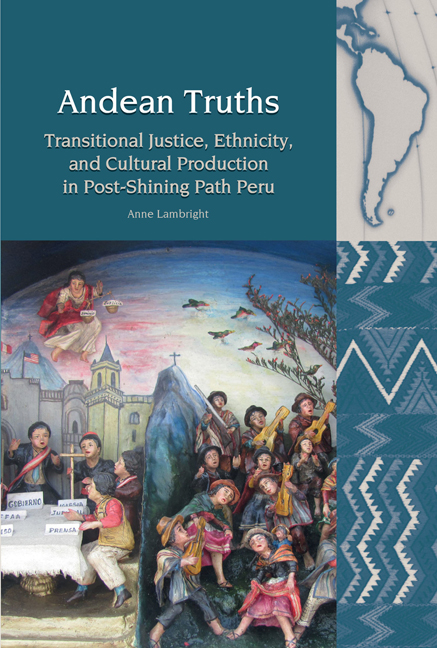Book contents
- Frontmatter
- Contents
- List of Figures
- Acknowledgements
- Introduction
- 1 Sustaining Dominant Narratives
- 2 Transitional Justice and Reconciliation through Identification
- 3 Dead Body Politics
- 4 Towards a Narrative Pachacutic
- 5 Collaborative Truth-Telling
- 6 Reconciling through other Knowledges
- 7 Conclusion
- Works Cited
- Index
6 - Reconciling through other Knowledges
- Frontmatter
- Contents
- List of Figures
- Acknowledgements
- Introduction
- 1 Sustaining Dominant Narratives
- 2 Transitional Justice and Reconciliation through Identification
- 3 Dead Body Politics
- 4 Towards a Narrative Pachacutic
- 5 Collaborative Truth-Telling
- 6 Reconciling through other Knowledges
- 7 Conclusion
- Works Cited
- Index
Summary
The Yuyarisun Contests in Ayacucho
On a crisp, sunny day in June 2013, around the main square in Huamanga, capital city of Huamanga province in the department of Ayacucho, there are signs posted touting Ayacucho as safe for tourists; several times a week garbage trucks pass to collect refuse. They carry loudspeakers with a message from the mayor—in Spanish and Quechua—announcing the good works being done for the progress of the region. Buildings are scrubbed of graffiti. The kantuta trees are in full bloom amidst carefully manicured flowerbeds. There is an overwhelming sense of urgency to prove, at ten years from the release of the Final Report, that Ayacucho has moved on.
Indeed, during this particular visit to Ayacucho, I heard several complaints of the waning attention to memory projects over the past decade. Some attribute this shift to lack of interest, a return to the days when olvido (forgetting) was de rigueur. But most point to limited funds that tend to be directed towards more ‘useful’ projects—those that would support the dominant image that Peru is progressing, that we have a ‘new’ Peru. But regarding the fact that memory projects have lost their importance over the decade following the CVR, at least one intellectual, Ramón Pajuelo, makes the astute observation that:
it is ironic to recognize that this occurs just as we begin to appreciate the formation of different (distinct) memories of the violence, which have been unfolding over the last decade, after the CVR, with differentiated feelings and positionings. (These memories) form a scenario of memory disputes in which once again the weakest—the victims of the violence—are the ones that have the least possibilities for crystalizing (their memories) in the public sphere and the greatest problems to be resolved.
These ‘different memories,’ often provoked or initiated by CVR-related enterprises, frequently go against the grain of official discourses on the Shining Path era and the post-conflict future of Peru. These responses defy easy interpretations of events and cookie-cutter resolutions based on ‘universal’ human rights values, while interrupting and belying dominant visions of a ‘new Peru’ moving forward in a unified manner, having faced and overcome the recent past.
- Type
- Chapter
- Information
- Andean TruthsTransitional Justice, Ethnicity, and Cultural Production in Post-Shining Path Peru, pp. 163 - 184Publisher: Liverpool University PressPrint publication year: 2015



